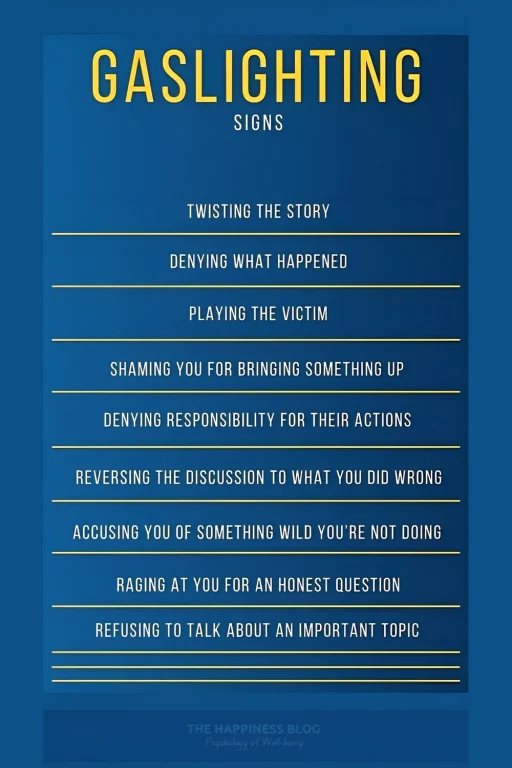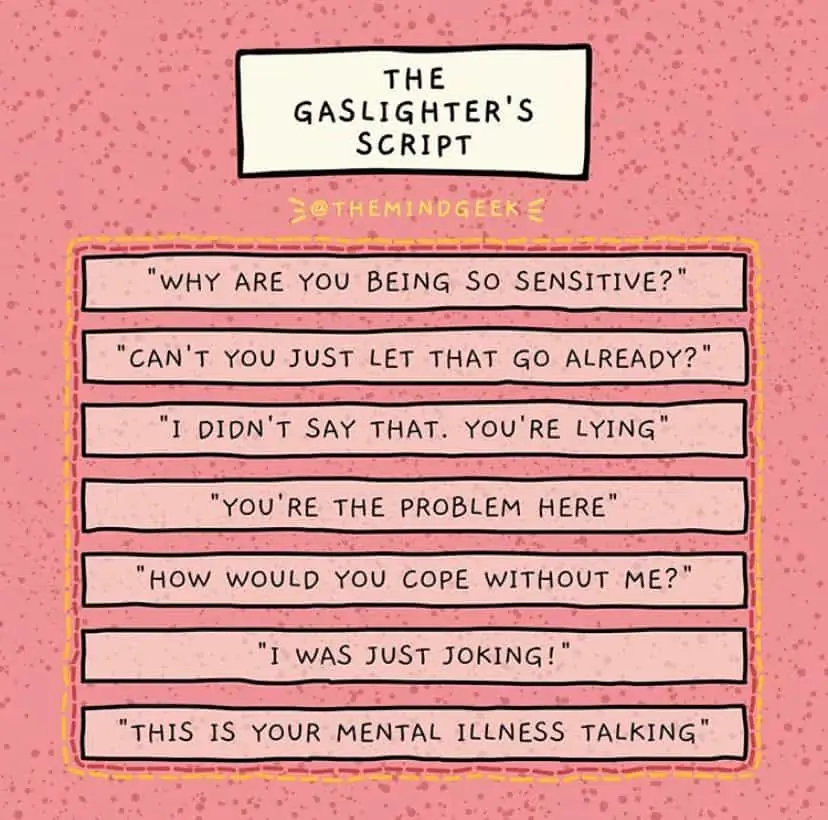Today's Sunday • 8 mins read
Gaslighters can subtly distort your perceptions of reality.
They can make you question the very things that you grew up with, such as your favorite color, your love for chocolate, or your fondness for puppies.
Gaslighting is manipulating someone psychologically to make them question their own sanity, particularly by leading them to doubt their own experiences or perceptions of reality.
- Gaslighter: the person doing the gaslighting.
- Gaslightee: the target person.
Gaslighting is abuse. Today, gaslighting is a well-known cultural phenomenon.
But it is still a pop-psychology term. The American Psychological Association (APA) does not formally recognize it.
10 Subtle Signs of Gaslighting
A gaslighter’s main work is to convince their target that their feelings, experiences, and ideas are wrong or unrealistic, and that they are losing their mind.
Some common gaslighting tactics are:
- denying the target’s version of events,
- getting angry for wanting to know the truth,
- blaming them for twisting their words (word salad),
- labeling the target as an idiot or other belittling terms,
- isolating the target from people who can validate your version.
Here are the 10 subtle signs of gaslighting:
1. Gaslighters are intolerant of criticism and disagreement.
They cannot calmly accept any feedback that does not agree with their viewpoints.
Pointing out their mistakes is often a trigger to make them explode in anger (as frequently seen in narcissistic rage).

2. Gaslighters are bullying and trollish in nature.
They would often raise their voice and show hostile behavior to get the other person to bend to their wishes and worldview.
They tend to hammer their point of view until the other person yields.
They can frequently convince their victim to give in to even the smallest of their demands.
The gaslighter in a relationship is usually easy to spot: they are mostly the more dominating partner.
Many online trolls are gaslighters.

3. They raise doubts about your high intelligence.
They keep questioning you if you correctly remember your memories, or if you’re actually expressing what you truly felt and perceived.
They keep doing it for many little things, and for a long time, until they find out you have also started to question your own memories and realities.
4. They stage and manage events to win trust.
They may predict an event and then stage a full set of arrangements to make it come true.
For example, they may tell you before going out to a celebratory event that you may win a prize in a fun contest, and then make all the arrangements to make you win.
They keep predicting events and fabricating reality to match their predictions so that you increasingly become trustful of their intuitions.
5. Gaslighters isolate you from your relatives and friends.
They use subtle manipulation to gradually convince you that you are not perceiving things correctly because people around you are hiding things from you.
They also tell you that they are the only ones who know the truth, so you must believe them instead of what others are telling you.
Remember, they may start subtly and almost harmlessly, but they are persistent. In time, they will muddle your thinking and erode your sense of daily life.
This isolation process is often seen in narcissistic relationships, and the process is called coercive control.
6. Gaslighters do not accept any truth that goes against them.
They will not accept any opposition to their fabricated reality, even if it is in the form of undeniable truths.
Even when you insist that what you know and see is the only truth, they will keep claiming that you are imagining things.
When shown evidence, they may shamelessly respond with, “It is all in your head” and back off for a while.
7. They never stop their gaslighting act.
Either they are gaslighting you, or they are plotting the next steps to gaslight you into mental instability.
They are always waiting for that moment when you will express your first doubt.
At this point, they can almost always respond with, “I told you so, but you won’t believe me that you are forgetting things these days.”
From then on, they will double down on their efforts to push you inside their “fake reality bubble.”
At precisely this point, the gaslighter smells the win and feels that your mental sanity is at the breaking point, and you can be proven to be a “crazy” person.
8. Gaslighters are low on empathy and compassion.
Empathy is the understanding of the experiences and feelings of others.
Compassion is the ability to understand another person’s feelings as well as the desire to help reduce that person’s suffering.
Gaslighters will never empathize with your misery and distress. They won’t because they have created it to take advantage of it.
If they ever show you compassion, it will be fake to increase your dependence on them.
Their callousness toward your state of mind will eventually break you down.
Then they will exploit your breakdown to portray you as mentally sick. Then they will accuse you of being responsible for your mental illnesses.
9. They often mask their gaslighting as microhostile behaviors.
Gaslighters often begin their gaslighting as microhostile behaviors (tiny sparks of angry reactions).
Then they will gradually make it into a more frequent and more regular pattern.
They will turn your erstwhile balanced relationship into an abuser-victim equation, which is psychologically damaging.

10. They may use psychological projection on you.
A gaslighter’s hallmark strategy is projection.
Projection is when someone assigns their own traits and actions to another person as their behavior.
For example, they may say, “You are always lazy,” when they discover a dirty spot in the house after you have cleaned it, even though they never clean.
It is often a defense mechanism to protect oneself from negative evaluations by others and to maintain one’s image as flawless.
When someone uses projection as a defense mechanism, they are projecting their own negative emotions or unacceptable behaviors onto someone else.
Gaslighters may tell you that you are a loser when they know deep down that they have been losers their entire lives.
As the victims struggle to save themselves, this diverts their attention away from the gaslighting action of their abuser.
Effects of Gaslighting On The Victim
Prolonged gaslighting can break a target’s self-esteem, erode confidence, distort self-image and viewpoint, and even lead to anxiety and depression.
Some more severe effects could be PTSD, thoughts about self-injury, high blood pressure, overthinking, paranoia, debilitating frustration, learned helplessness, symptoms of dependence disorder, and phobias.
Some may experience a “nervous breakdown” or go into rage spells (“reactive abuse“) because of their partner’s constant gaslighting. In the worst cases, the target may inflict self-harm.
Most of the time, the target is so confused that they are unable to recognize that their mental state is the result of the gaslighter’s manipulations, rather than their own.
Origin Story of Gaslighting
The term “gaslighting” comes from George Cukor’s 1944 film Gaslight.
It has a husband gaslighting his wife for forgetting things, but she blames only herself for her memory lapses. Only much later does she realize he has been making up false facts to drive her insane.
Early in the film Gaslight, the husband, Gregory Anton, asks his wife, Paula, to look at the wall behind her. Paula looks back and gasps:
“The picture is gone again!”
“Yes. Where have you hidden it this time?” asks Gregory.
“I didn’t take it. Why should I take it? It’s of no use to me.” Paula says through her tears.
She rushes upstairs to her room but stops at the landing. She sees the framed photo looking out from behind the staircase cabinet. Gregory walks up to the landing and tells her,
“So, you did know where it was.”
Gregory wants to prove that she lies about things because she’s losing her ability to remember them.
He later uses his signature ploy: secretly dimming and brightening the gaslight. When Paula complains about the flickering of lights, he claims she is hallucinating it.
The gaslighted victim-wife was played by Ingrid Bergman, who won that year’s Academy Award for Best Actress in a leading role.
Final Words
Never forget that a gaslighter’s ultimate goal is to drive you insane. They will push you until you give up trying to prove your reality and accept their made-up version.
But some of the reasons why people gaslight in relationships are truly surprising.
That’s the point at which they win, and you get judged as mentally unfit.
• • •
√ Also Read: How To Stop Gaslighting In Relationships And Take Back Power
√ Please spread the word if you found this helpful.
» You deserve happiness! Choosing therapy could be your best decision.
...
• Disclosure: Buying via our links earns us a small commission.
